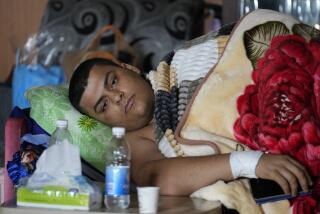Maliki Hails Sunni Lawmaker’s Release
- Share via
BAGHDAD — Iraq’s Shiite-led government, beset by sectarian violence, fuel shortages and rising prices, received a significant boost Saturday when kidnappers released a Sunni Arab lawmaker whose abduction nearly two months ago unleashed a political crisis.
Taiseer Mashhadani was freed unharmed after extensive pleas from the U.S.-backed administration of Prime Minister Nouri Maliki, who heads the ruling Shiite coalition.
“They were very polite and treated me well,” Mashhadani said of her abductors after her release. She appeared to be calm and said she watched television with her captors. “I never heard an insult from them.”
An elated Maliki, who received Mashhadani at his office, called her release a “gift” as his government embarked on an ambitious campaign to reconcile Iraq’s warring sects and factions.
“This is an important step and achievement for the reconciliation process,” Maliki said. “This is a good start.” He said no ransom was paid for the lawmaker’s release.
The case, with its sectarian overtones, had frustrated the Shiite leadership and seemed to mock Maliki’s assertions that he was committed to reaching out to minority Sunni Arabs, who dominated Iraq’s government until President Saddam Hussein was toppled in the U.S.-led invasion in 2003. Disaffected Sunnis have formed the backbone of the insurgency.
Mashhadani is part of the Sunni Arab parliamentary minority whose participation is vital if Iraq is to have a “national unity” government, as the prime minister has repeatedly vowed to implement. She represents the Iraqi Islamic Party, a major Sunni political grouping in the troubled 3-month-old government.
U.S. officials are hopeful that a truly representative system eventually will help quell the violence, which skyrocketed in July with more than 100 killings reported each day. Maliki’s government is also conducting a security crackdown in the capital, with U.S. troops and Iraqi forces sweeping some of the city’s most dangerous neighborhoods.
Even as the bloodshed persists, the Maliki government is facing growing disenchantment over fuel shortages -- gas lines here can reach a mile -- and rising prices, with the inflation rate at 70%. The prime minister has been yearning for some good news.
Against such a dreary backdrop, Shiite and Sunni tribal chiefs gathered Saturday in Baghdad signed a “pact of honor” stipulating that they would work together to avert an all-out civil war.
“Tribes should play an essential role in confronting terrorism,” Maliki told the assembled clan leaders, who are traditional power brokers in Iraq, especially in rural areas.
The sheiks vowed to work for peace. But Sunni chieftains warned against splitting Iraq into autonomous regions -- a proposal staunchly opposed by most Sunnis but favored by many Shiites and Kurds who support Maliki’s ruling coalition. The financial stakes are high: The Kurdish north and Shiite south have vast oil reserves, but the Sunni regions of central, western and northern Iraq have no such natural wealth.
Even as the sheiks and the prime minister spoke of harmony, a leading Shiite cleric, Abdelaziz Hakim, reiterated calls Saturday for autonomy for the mostly Shiite south. Hakim lauded “federalism” -- a codeword for autonomy -- as “a guarantee to our sons and grandsons that oppression will not be revived.”
Hakim’s comments seemed sure to deepen Sunni mistrust of him and his powerful party, the Supreme Council for Islamic Revolution in Iraq, which has been accused of sponsoring anti-Sunni death squads.
No organization took responsibility for the high-profile kidnapping of Mashhadani, but many suspected the Shiite militias that have been suspected in the killings of hundreds of Sunni Arabs here. That suspicion seemed to be confirmed some weeks ago when officials revealed that the kidnappers had demanded the liberation of Shiite prisoners in exchange for the lawmaker’s release.
Mashhadani and several bodyguards were seized July 1 by gunmen in a Shiite area of northern Baghdad as her entourage was traveling from Diyala province to attend a parliamentary session the next day. Three of her bodyguards were freed shortly afterward, and Mashhadani said she expected the release soon of two others still being held.
Violence continued to rage across Iraq on Saturday.
Authorities found the bodies of 20 men dumped in various parts of the capital, some showing signs of torture, a police official said. Most were executed with shots in the head, and some were handcuffed and blindfolded, the official added.
Gunmen in the troubled city of Baqubah, northeast of the capital, attacked a Shiite family, killing two women and two children and wounding 11 people.
In Iskandariya, south of Baghdad, a car bomb outside a Shiite mosque killed three people and wounded 17, Reuters reported.
Four Kurdish civilians were gunned down in the northern city of Kirkuk, where Kurds, Arabs and Turkmens are vying for dominance.
In the largely Sunni city of Tikrit, north of the capital, gunmen killed three Shiite bakery workers.
A female interpreter was killed and another wounded as they left a British base in the southern city of Basra.
Saif Rasheed of The Times’ Baghdad Bureau and special correspondents in Baqubah, Tikrit, Kirkuk, Najaf and Basra contributed to this report.
More to Read
Sign up for Essential California
The most important California stories and recommendations in your inbox every morning.
You may occasionally receive promotional content from the Los Angeles Times.













